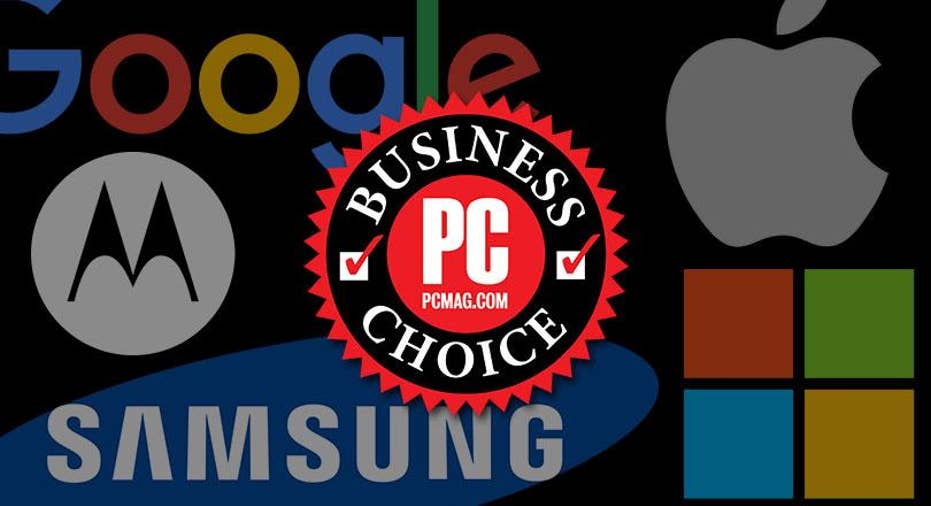Business Choice Awards 2017: Smartphones

Smartphones, which have been kicking around for a decade, have gone from curiosity to compulsory for teens taking selfies, parents coordinating schedules, and those getting work done beyond email. Whether you take your personal handset to work or use your work smartphone at home, chances are there is a good amount of work happening on that small screen.
We asked our readers during a recent survey to rate just how well their brand of smartphone does when it comes to completing work tasks. They rated the top brands available on the market today; those scoring the highest are spelled out below, but only one can be good enough to earn the Business Choice Award.
You can be part of Business Choice! Sign up for the Readers' Choice Survey mailing list to receive invitations in the future.
Looking for expert opinion? Read The Best Unlocked Phones of 2017.
Smartphones for Work
There are essentially three smartphone operating systems out there that anyone takes seriously (at least seriously enough to buy in any quantity high enough to make it into our survey results): Android, iOS, and Windows. Like last year, the results show that Apple's system—which is so tightly integrated with its iPhones that they're pretty much the same thing in this survey—is not up to snuff for work.
The winner this year for Business Choice Smartphone is, once again, Google. Last year it was based entirely on its own line of phones under the Nexus brand; this year Google introduced two phones in the Pixel line and they've done nothing to dampen users' enthusiasm for them at work.
Google again scores a 9.1 (on a 0 to 10 scale, with 10 as the best) for work satisfaction. Google phones are also tops when it comes to setup and likelihood to be recommended. If Google is lacking in any area, it's that a full one-fifth of business-case smartphone users needed to contact tech support—a higher percentage than any other in this survey.
The runner up, like last year, is Microsoft's Windows phone OS. The company's desire to turn Windows into a universal OS isn't exactly burning up the charts in the everyday world, but obviously those who embrace a Windows phone for the office don't have a problem with it. Perhaps because once you've mastered Windows on a desktop, it's not hard to make that switch to the mobile world.
Microsoft is neck and neck with Google on most of its scores, tying for work satisfaction and reliability (9.1 for each); Microsoft also had the lowest number of smartphones that needed repair (7 percent). It's hampered only by a lower likelihood to recommend score of 8.4, a number that ties with Motorola phones running Android, and which is behind even Apple. Microsoft also gets an expectedly dismal score when it comes to the availability of apps (5.9).
Speaking of Moto and Apple, their work satisfaction scores are almost a full point behind Google/Microsoft. It's not typical to see Apple score such run-of-the-mill numbers among PCMag readers, but it's clear that when it comes to getting work done, the iPhone isn't cutting it. Apple didn't even score the best in availability of apps, a traditional stronghold due to the size of the Apple App Store. It earned a still respectable 8.9, but so did Moto. Google earned a 9.3 for app availability.
Apple's work satisfaction score of 8.2 in fact puts it in the same range as Samsung and LG phones running Android. But our readers make it clear, if you're going to get an Android phone to do your work on, try to make it a Google Pixel or Pixel XL.
See all of our survey results for work smartphones.
WINNERS: SMARTPHONES FOR WORK
Google Apple learned long ago that making your hardware and software work together makes them sing. Google has picked up on that with the Nexus and Pixel lines, and proven it can go Apple one better in the bargain: by being the best maker of handsets for businesses.
Methodology
We email survey invitations to PCMag.com community members, specifically subscribers to our Readers' Choice Survey mailing list. This survey was hosted by Equation Research, which also performs our data collection. This survey was in the field from February 21, 2017 through March 13, 2017.
Respondents were asked to rate their smartphone using multiple questions about their overall satisfaction, as well as experiences with technical support within the past 12 months.
Because the goal of the survey is to understand how the smartphones compare to one another and not how one respondent's experience compares to another's, we use the average of the rating, not the average of every respondent's rating. In all cases, the overall ratings are not based on averages of other scores in the table; they are based on answers to the question, "Overall, how satisfied are you with your smartphone for work?"
Scores not represented as a percentage are on a scale of 0 to 10 where 10 is the best.
Net Promoter Scores are based on the concept introduced by Fred Reichheld in his 2006 best seller, The Ultimate Question, that no other question can better define the loyalty of a company's customers than "how likely is it that you would recommend this company to a friend or colleague?" This measure of brand loyalty is calculated by taking the percent of respondents who answered 9 or 10 (promoters) and subtracting the percent who answered 0 through 6 (detractors). (For more, read PCMag's Top Consumer Recommended Companies for 2016.)
If you would like to participate in PCMag's monthly Readers' Choice surveys and to be eligible for our monthly sweepstakes promotion, please sign up today. Respondents are automatically entered in a sweepstakes for each new survey.
This article originally appeared on PCMag.com.



















